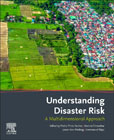
Understanding Disaster Risk
Santos, Pedro Pinto
Chmutina, Ksenia
Von Meding, Jason
Raju, Emmanuel
Understanding Disaster Risk: A Multidimensional Approach presents the first principle from the UNISDR Sendai Framework for Disaster Risk Reduction, 2015-2030. The framework includes discussion of risk and resilience from both a theoretical and governance perspective in light of the ideas that are shaping our common future and presents innovative tools and best practices in reducing risk and building resilience.Combining the applications of social, financial, technological, design, engineering, and nature-based approaches, the volume addresses rising global priorities and focuses on strengthening the global understanding of vulnerability, displaced communities, cultural heritages, and cultural identity. It presents a multifaceted understanding of disaster addressing both historic and contemporary issues and asking researchers and governments how they can use technological advances, risk and resilience metrics and modeling, business continuity practices, and past experiences to assess disasters and improve disaster risk reduction policies and practices. Focusing on the various dimensions of disaster risk, the book details natural and social components of risk and the challenges posed to risk assessment models under the Climate Change paradigm. Addresses the current challenges on the policy and practice of building resilience strategiesFollows the global frameworks for disaster risk reduction and sustainability, specifically the UNISDR Sendai Framework for DRR, 2015-2030Aids in understanding the natural and the social components of risk in a diverse and globalized worldPresents the challenges posed to risk assessment models under the Climate Change paradigm INDICE: Section 1. Resilience of communities in long term displacements and Resilient communities at the center of Big Data analyticsSection 2. Resilience, vulnerability, exposure and hazards: discussing and operationalizing conceptsSection 3. Understanding risks linked to Climate ChangeSection 4. Bushfire risk: the natural and social components of the equationSection 5. Risks, vulnerabilities and diversity in the globalized world
- ISBN: 978-0-12-819047-0
- Editorial: Elsevier
- Encuadernacion: Rústica
- Páginas: 400
- Fecha Publicación: 01/01/2020
- Nº Volúmenes: 1
- Idioma: Inglés
